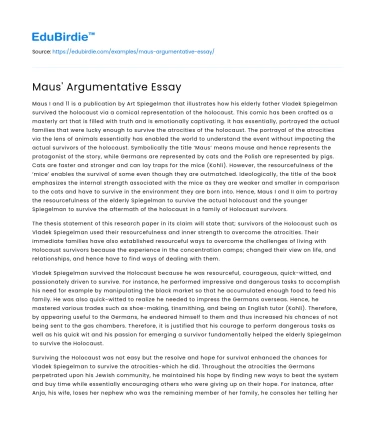Maus I and 11 is a publication by Art Spiegelman that illustrates how his elderly father Vladek Spiegelman survived the holocaust via a comical representation of the holocaust. This comic has been crafted as a masterly art that is filled with truth and is emotionally captivating. It has essentially, portrayed the actual families that were lucky enough to survive the atrocities of the holocaust. The portrayal of the atrocities via the lens of animals essentially has enabled the world to understand the event without impacting the actual survivors of the holocaust. Symbolically the title ‘Maus’ means mouse and hence represents the protagonist of the story, while Germans are represented by cats and the Polish are represented by pigs. Cats are faster and stronger and can lay traps for the mice (Kohli). However, the resourcefulness of the ‘mice’ enables the survival of some even though they are outmatched. Ideologically, the title of the book emphasizes the internal strength associated with the mice as they are weaker and smaller in comparison to the cats and have to survive in the environment they are born into. Hence, Maus I and II aim to portray the resourcefulness of the elderly Spiegelman to survive the actual holocaust and the younger Spiegelman to survive the aftermath of the holocaust in a family of Holocaust survivors.
The thesis statement of this research paper in its claim will state that; survivors of the Holocaust such as Vladek Spiegelman used their resourcefulness and inner strength to overcome the atrocities. Their immediate families have also established resourceful ways to overcome the challenges of living with Holocaust survivors because the experience in the concentration camps; changed their view on life, and relationships, and hence have to find ways of dealing with them.
Save your time!
We can take care of your essay
- Proper editing and formatting
- Free revision, title page, and bibliography
- Flexible prices and money-back guarantee
Vladek Spiegelman survived the Holocaust because he was resourceful, courageous, quick-witted, and passionately driven to survive. For instance, he performed impressive and dangerous tasks to accomplish his need for example by manipulating the black market so that he accumulated enough food to feed his family. He was also quick-witted to realize he needed to impress the Germans overseas. Hence, he mastered various trades such as shoe-making, tinsmithing, and being an English tutor (Kohli). Therefore, by appearing useful to the Germans, he endeared himself to them and thus increased his chances of not being sent to the gas chambers. Therefore, it is justified that his courage to perform dangerous tasks as well as his quick wit and his passion for emerging a survivor fundamentally helped the elderly Spiegelman to survive the Holocaust.
Surviving the Holocaust was not easy but the resolve and hope for survival enhanced the chances for Vladek Spiegelman to survive the atrocities-which he did. Throughout the atrocities the Germans perpetrated upon his Jewish community, he maintained his hope by finding new ways to beat the system and buy time while essentially encouraging others who were giving up on their hope. For instance, after Anja, his wife, loses her nephew who was the remaining member of her family, he consoles her telling her that; ‘No darling, to die it’s easy…but you have to struggle to live! Until the last moment, we must struggle together! I need you!’ (Kohli, pp. 122). Spiegelman emphasizing to his wife that they needed each other essentially shows a man who realized the value of unity and hence this helped them to survive the Holocaust against all odds.
Art Spiegelman the son of Spiegelman has to survive living with his parents who were exponentially changed by their experiences in the German concentration camps. For example, his father has essentially changed from a resourceful and brave young man with a passion to live to a mean-spirited old man filled miserly and always complaining about everything. The old man complains about his deceased wife and hence shows he has had a hardened heart judging how fast he got over Anja’s death. Valdek burns her diary and is compulsively not ready to waste anything based on how much they lack basic utilities during the Holocaust (Kohli). Therefore, his son has to find new ways to understand and relate to his elderly father because his actions and words are influenced by the hardship and struggles he went through under Hitler’s Nazi government.
In conclusion, it is justified to note that Vladek Spiegelman survived the Holocaust due to his quick wit, courage, and passionate drive to live and save his family. However, it is evident that despite emerging through the atrocities in the Holocaust; the experience completely changed these particular individuals and hence brought challenges for their children and families who did not experience the Holocaust, to live and relate with them. Maus I and 11 have thus been able to portray the effects of the Holocaust on its victims and their families. Art Spiegelman also establishes a better understanding of the Holocaust through a comical and symbolic representation that essentially does not affect the victims by keeping the impact and atrocities perpetrated upon the Jews alive for future generations (Kohli). The thesis statement of this research paper is thus justified in its claim that; survivors of the Holocaust such as Vladek Spiegelman used their resourcefulness and inner strength to overcome the atrocities. Their immediate families have also established resourceful ways to overcome the challenges of living with Holocaust survivors because the experience in the concentration camps; changed their view on life, and relationships, and hence have to find ways of dealing with them.






 Stuck on your essay?
Stuck on your essay?

